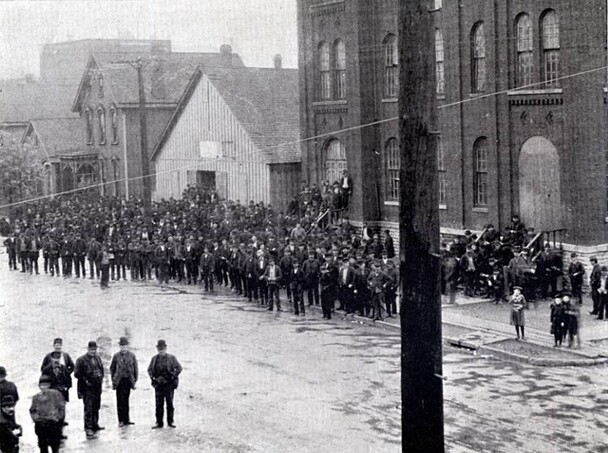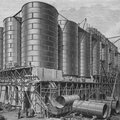
Grain scoopers gathered at St. Bridget's, Louisiana Street, 1899. Image Source: 1900 Buffalo Express Yearbook.
They were grain scoopers, 1,500 of the nearly 6,000 Buffalo dockworkers. They were paid $4.90 per day before their saloon boss took his cut and subtracted each scooper's bar bill, meal bill and lodging costs, often leaving the scooper with nothing.
But the reason they went on strike in May, 1899 was because the boss of the saloon bosses, William "Fingey" Connors, announced that they would have a pay cut amounting to 50% of what they earned per day the previous year. The "company store" system that governed their livelihoods was about to change. The almost-entirely Irish-American scoopers went on strike early in May, 1899.
The striking scoopers had two factors on their side: time and Bishop Quigley, head of the Catholic church in Buffalo. By May 12, 43 ships carrying 3.6 million bushels of grain were waiting to be unloaded in the Buffalo harbor. The supply was backed up also, with 24 million bushels awaiting shipment in Duluth in addition to supplies at other ports. The shipper's association brought pressure on Conners to resolve the issue. Bishop Quigley, himself a former dockworker, opened St. Bridget's for the strikers' use as a headquarters and also assisted with strategy and public statements calling for all dockworkers to honor the strike.
By the end of May, the strike was over. The shippers's assocation contacted the union and Bishop Quigley and permanently broke the saloon boss system. The new union, Local 109, would represent the grain scoopers from then on.
William Conners, who began his career in the lowest jobs on the waterfront, had built a fortune largely through his own talents and the labor of grain scoopers and packet handlers. Though no longer a force in the waterfront contract labor system, he had already diversified his fortune by buying the Magnus Beck Brewery, the Vulcanite Asphalt Paving Company, large tracts of land in South Buffalo and a string of newspapers: the Buffalo Enquirer, Morning Record, and Buffalo Courier. He moved into a mansion on Delaware Avenue and created the Courier-Express newspaper which his son would continue after his death in 1929.
As recently as 1940, nine of 10 members of the Grain Shovelers Union Local 109 were Irish-Americans. By 1998, the total number of members had dwindled to 55 due to lack of work. The profession of grain scooping, unique to Buffalo, ended by the spring of 2003 when the straight deck bulk carrier Kinsman Independent was unloaded of its grain. Grain coming to Buffalo now is unloaded by completely automated ships.












